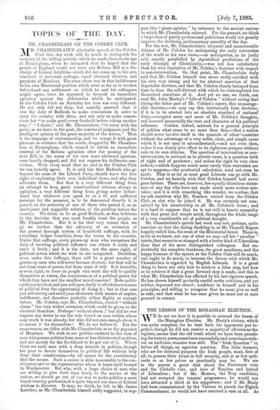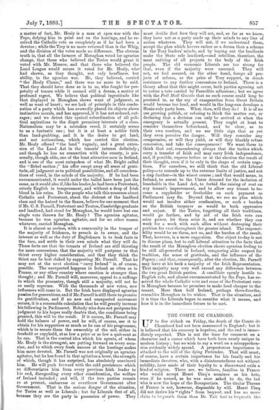THE LESSON OF THE MONAGHAN ELECTION.
WE do not see how it is possible to misread the lesson of the Monaghan Election. Mr. Healy's victory, which was quite complete, for he beat both his opponents put to- gether, though he did not receive a majority of all votes on the register, means that the old truth which we have been preach- ing for twenty years,sometimes successfully and sometimes with- out an audience, remains true still. The "Irish Question" is, before all things, an agrarian question. The little farmers, who are for electoral purposes the Irish people, want, first of all, to possess their farms in full security, and at as low quit- rents or as low prices as practically may be. We see in the papers a great deal about the Protestant vote and 'the Catholic vote, and love of Toryism and hatred of Liberalism ; but if Mr. Monroe, the Tory candidate, had not accepted the tenants' programme, he would not have attracted a third of his supporters ; and if Mr. Healy had been commissioned by the Vatican to preach the Eighth Commandment, he would not have received a vote at all. As
a matter of fact, Mr. Healy is a man at open war with the Pope, defying him in print and on the hustings, and he re- ceived the Catholic vote as completely as if he had been a devotee ; while the Tory is no more returned than is the Whig, and the division of the votes made no difference. The obvious truth is, that all the farmers of Monaghan voted for agrarian change, that those who believed the Tories would grant it voted with Mr. Monroe, and that those who believed the Land League would secure it voted for Mr. Healy, whorn had shown, as they thought, not only heartiness, but ability, in the agrarian war. He, they believed, carried "the Healy Clause," and there was no more to be said. That they should have done so is to us, who fought for per- petuity of tenure while it seemed still a dream, a matter of profound regret. We believe that political ingratitude like that displayed in Monaghan shows want of judgment, as well as want of heart ; we see lack of principle in this condo- nation of a party which has avowedly placed its objects above instinctive morals, and has approved, if it has not ordered, out- rages ; and we detest this cynical subordination of all poli- tical aspirations to the direct pecuniary interests of a class. Nationalism may be a mistaken creed, it certainly seems to us a fantastic one ; but it is at least a nobler faith than land-grabbing, and it is the desire to get land, and not nationalism, which has carried this election. Mr. Healy offered "the land" vaguely, and a great exten- sion of the Land Act in the tenants' interest definitely ; and though he has no connection with the county, is per- sonally, though able, one of the least attractive men in Ireland, and is one of the most outspoken of what Mr. Bright called the "Rebel section ;" his offer swept away all sense of grati- tude, all judgment as to political possibilities, and all considera- tions of creed, in the minds of the majority. If he had been excommunicated, it would under the ballot have been just the same, as it would also if,like his leader,he had been a Protestant, utterly English in temperament, and without a drop of Irish blood in his veins. Do the people who talk this nonsense about Catholic and Protestant, about the distrust of the landlord class and the hatred to the Saxon, believe for one moment that if Mr. C. S. Parnell, Protestant and Teuton, Cambridge graduate and landlord, had stood for Monaghan,he would have lost one single vote thrown for Mr. Healy The agrarian agitator, because he was agrarian agitator, and for no other reason whatever, carried Monaghan.
It is almost as useless, with a community in the temper of the majority of Irishmen, to preach is to swear, and the interest as well as the duty of Englishmen is to look facts in the face, and settle in their own minds what they will do. Those facts are that the tenants of Ireland are still thirsting for more concessions, that the majority will postpone to that thirst every higher consideration, and that they think the thirst can be best slaked by supporting Mr. Parnell. That he may not at the next election "carry Ireland" is, of course, possible. The unexpected happens in Ireland as often as in France, or any other country where emotion is stronger than thought ; and Mr. Parnell will, moreover, appeal to a suffrage in which the peasantry, though still a majority, will not be so easily supreme. With the thousands of new votes, new influences will come in. But the Irish have displayed agrarian passion for generations, and if Mr. Parnell is still there to promise its gratification, and if no new and unexpected movement occurs, it is a reasonable calculation that he will greatly increase his following in Parliament. Nobody who does not postpone his judgment to his hopes really doubts that, the conditions being granted, this will be the result. If it occurs, Mr. Parnell may hold the balance of power, and he will, of course, use it to obtain for his supporters as much as he can of his programme, which is to secure them the ownership of the soil, either in freehold or copyhold, at as low a price or as low a quit-rent as he can. That is the central idea which his agents, of whom Mr. Healy is the strongest, are putting forward on every occa- sion, and to which every fresh success at the hustings makes him more devoted. Mr. Parnell was not originally an agrarian agitator, bat he has found in that agitation a lever, the strength of which, though it has surprised, has absolutely convinced him. He will push forward with the cold persistence which so differentiates him from every previous Irish leader to his end, disregarding every other consideration, the welfare of Ireland included ; and will, if the two parties remain as at present, embarrass or overthrow Government after Government. That is the serious danger of the situation, for Tories as well as Liberals ; but for Liberals first of all, because they are the party in possession of power. They must decide first how they will act, and, so far as we know, they have not as a party made up their minds to any line of action whatever. They will not, if we understand them, accept the plan which hovers rather as a dream than a scheme in the Tory leaders' minds, and by buying out the landlords make the State sole landlord,—and rebellion, therefore, the most enticing of all projects to the body of the Irish people. The old economic Liberals are too strong for that, even if the majority were unsound. They will not, we feel assured, on the other hand, forego all pro- jects of reform, as the price of Tory support, in dumb resistance to any further concessions to Ireland. There is a theory afloat that this might occur, both parties agreeing not to notice a vote carried by Parnellite adhesions ; but wo agree with the Pall Mall Gazette that no such course could long be persisted in, as the cry of exasperation from Great Britain would become too loud, and would in the long-run develope a Honie-rule party here. What, then, will they do I It is of no use growing pettish, or refusing to think the matter out, or declaring that a decision can only be arrived at when the emergency is actually present. They ought at least to consider themselves beforehand, and be clear, as to their own resolves, and we see little sign that as yet they even perceive the danger. Will they consider any compromise, or will they yield, or will they blankly refuse concession, and take the consequences ? We want them to. think that out, remembering always that the tactics which carry a transfer of Irish soil may carry Irish independence, and, if possible, express before or at the election the result of their thought, even if it be only in the shape of certain nega- tions. For ourselves, we still think that the old Liberal policy—to concede up to the extreme limits of justice, and not a step further—is the wisest course ; and that would mean, in Ireland, to assent to the Ulster demand for the inclusion of leaseholds in the Land Act, to forbid the raising of rent on any tenant's improvement, and to allow any tenant to be- come a copyholder or freeholder on such payment as Parliament may fix. Beyond that, we see no plan which would not involve either confiscation, or such a burden on the British taxpayer as would be both oppressive and unjust. If the Tories, forgetting all their traditions, would go farther, and by aid of the Irish vote can seize power, let them seize it, and see whether they can work for a week with such allies without destroying their position for ever throughout the greater island. The responsi- bility would be on them, not us, and the burden of the result. That, however, is a mere suggestion. Our object to-day is not to discuss plans, but to call Liberal attention to the facts that the result of the Monaghan election shows agrarian feeling to be still all-powerful in Ireland, conquering alike respect for tradition, the sense of gratitude, and the influence of the Papacy ; and that, consequently, after the election, Mr. Parnell may have at his beck a majority of the Irish Representation. That majority may very well exceed any difference between the two great British parties. A candidate openly hostile to. English rule, and almost excommunicated by the Rope, has re- aeived the whole Catholic vote and some of the Protestant vote in Monaghan because he promises to make land cheaper to the tenant. More than half Ireland, perhaps three-fourths, resembles Monaghan in its wishes. That is the situation, and it is time the Liberals began to consider what it means, and how it is in the immediate future to be met.



































 Previous page
Previous page